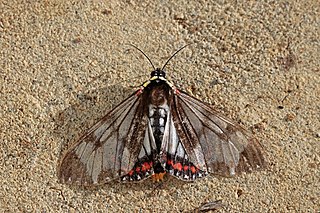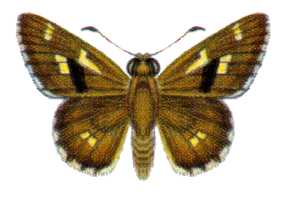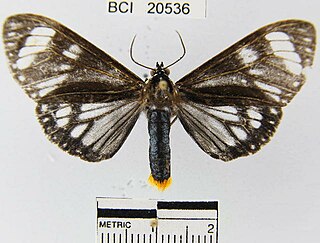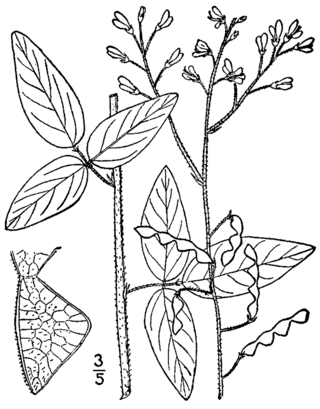
Enoplea (enopleans) is a class, which with the classes Secernentea and Chromadorea make up the phylum Nematoda in current taxonomy. The Enoplea are considered to be a more ancestral group than the Chromadorea, and researchers have referred to its members as the "ancestrally diverged nematodes", compared to the "more recently diverged nematodes" of Chromadorea.
Haycocknema perplexum are nematodes which reside in tissues under the skin or in blood vessels. The origin of these parasites and their natural hosts are not known at this time. This group is around 8% of nematode species which affect vertebrates. Clinical symptoms of this parasite include eosinophilia and high levels of creatine kinase. While rare with only thirteen documented cases, all originating in Australia, this parasite can become fatal if untreated due to the muscles of the respiratory system becoming unable to function properly.

Canistrum is a genus of plants in the family Bromeliaceae, subfamily Bromelioideae.

The Blastobasidae are a family of moths in the superfamily Gelechioidea. Its species can be found almost anywhere in the world, though in some places they are not native but introduced by humans. In some arrangements, these moths are included in the case-bearer family (Coleophoridae) as subfamily Blastobasinae. The Symmocidae are sometimes included in the Blastobasidae as subfamily or tribe.

Dysschema is a genus of tiger moths in the family Erebidae. The genus was erected by Jacob Hübner in 1818. The genus contains some of the more showy moths of the southwestern United States.
Tecmerium is a genus of moths in the family Blastobasidae.

Stylidium perplexum is a species of triggerplant that is endemic to south-west Western Australia. It is a tuberous species that has many stems and has been described as "somewhat shrubby" at 15–40 cm tall. The linear leaves can be 2 cm long and are arranged around the stem in a rosette at the stem apices. The 8–19 cm tall scapes bear 6 to 14 flowers that are white with purple accents and corolla lobes that are laterally paired and 4–6 mm long.

Ataxocerithium is a genus of sea snails, marine gastropod molluscs in the family Newtoniellidae.

Neohesperilla xiphiphora, the xiphiphora skipper, is a butterfly of the family Hesperiidae. It is found in the Northern Territory and Cape York of Australia.

Holcocera irroratella is a moth in the family Blastobasidae. It is found in South Africa and Gambia.
Tecmerium anthophaga is a moth in the family Blastobasidae. It is found in France, Portugal and Spain, as well as on Corsica and Sardinia.
Tecmerium mnemosynella is a moth in the family Blastobasidae. It is found in France.
Tecmerium rosmarinella is a moth in the family Blastobasidae. It is found in France.
Tecmerium spermophagia is a moth in the family Blastobasidae. It is found in Portugal and Spain.

Dysschema perplexum is a moth of the family Erebidae first described by William Schaus in 1910. It is found in Panama and Costa Rica.

Desmodium glabellum is a perennial herb and wildflower in the pea family native to eastern and central North America. It grows in fields, woodland borders, and disturbed areas.

Anthidiellum is a genus of rotund resin bees in the family Megachilidae. There are more than 60 described species in Anthidiellum.

Anthidiellum perplexum is a species of bee in the family Megachilidae.
Chrysotoxum perplexum is a species of syrphid fly in the family Syrphidae.
Silphium perplexumJ.R.Allison is a prairie species in the Asteraceae endemic to the state of Alabama. S. perplexum is commonly known as Old Cahaba rosinweed, a reference to the Cahaba River near which all populations of this species are found.











